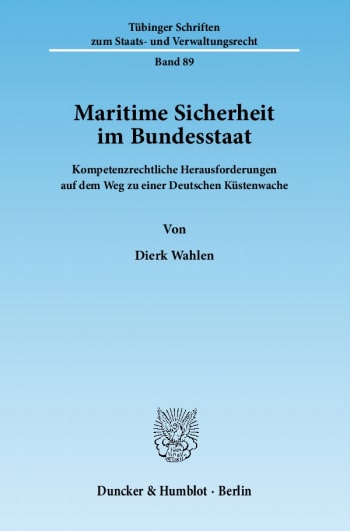Kompetenzrechtliche Herausforderungen auf dem Weg zu einer Deutschen Küstenwache. - Print + E-Book
Description
Maritime navigation is exposed to various dangers. Aside from the risk of operating accidents it faces the omnipresent threat of piracy and increasing warnings even of a »maritime 9/11«. All these dangers have to be averted effectively. Yet in Germany there are federal and administrative barriers that prevent an effective and efficient enforcement of maritime safety and security. There is no unitary German Coast Guard. There is rather a multitude of authorities of Bund and Länder charged with partial functions that are involved in policing at sea. Instead of clear structures there is a tangle of responsibilities. In recent years attempts have been made to reduce the consequential loss in effectiveness and efficiency by strengthening coordination and cooperation among the particular authorities. This, however, runs up against constitutional limits imposed by the Grundgesetz which allows federal cooperation only on a small scale. Thus, effectiveness and efficiency cannot be increased by establishing closer cooperation. Instead of mitigating its consequences, the root causes for the fragmentation of functions have to be changed. What is needed is a fundamental reform of the responsibilities at sea. Some steps can be taken already under current constitutional law. The foundation of a unitary German Coast Guard, however, requires an amendment to the Grundgesetz. The fragmentation of civil responsibilities, however, is not the only problem. Furthermore, naval forces can only be engaged insufficiently to support policing measures at sea in cases of urgent need. Actual or pretended restrictions of the Grundgesetz may lead to situations in which the police are allowed but not able to act, whereas the navy is able but not allowed to. This governmental incapacity to act has to be resolved.
Overview
1. Teil: Einführung
Problemstellung – Ziel der Untersuchung – Gang der Untersuchung
2. Teil: Die Kompetenzen zur Gefahrenabwehr auf See
Gesetzgebungskompetenzen – Vollzugskompetenzen – Abgrenzungsschwierigkeiten und Effizienzverluste
3. Teil: Zusammenarbeit bei der Gefahrenabwehr auf See
Erscheinungsformen der Zusammenarbeit – Möglichkeiten und Grenzen administrativer Zusammenarbeit – Verfassungsrechtliche Bewertung der praktizierten Zusammenarbeit – Zwischenfazit
4. Teil: Ansätze zu einer Neuordnung der Kompetenzen
Reformansätze de constitutione lata – Reformansätze de constitutione ferenda
5. Teil: Seestreitkräfte und maritime Gefahrenabwehr
Gefahrenabwehr durch Streitkräfte – Polizeiliche Verwendungen der Marine – Normative Reformansätze
6. Teil: Schlussbetrachtungen
Zusammenfassung – Ausblick
Literatur- und Sachverzeichnis































